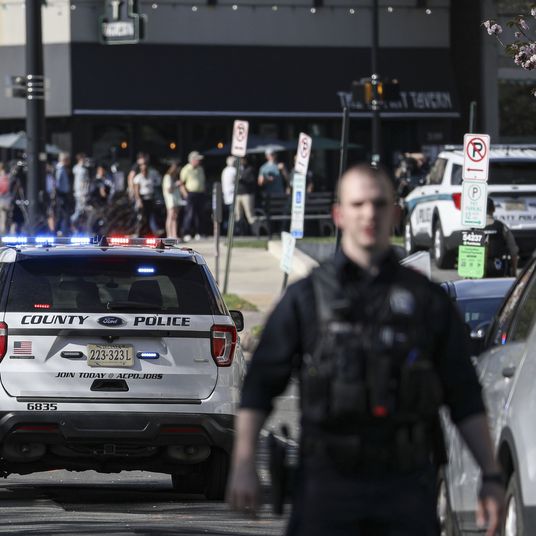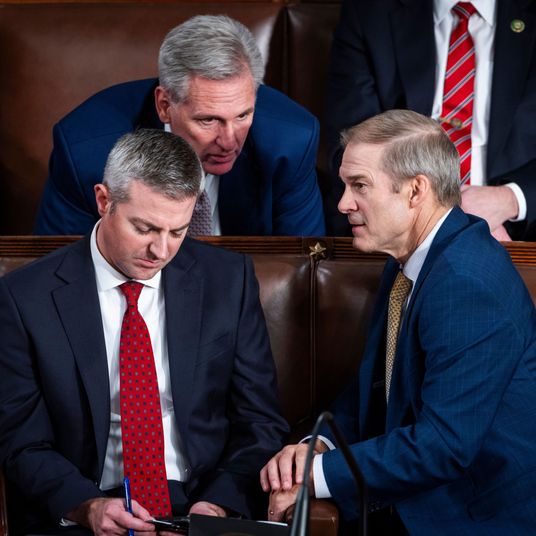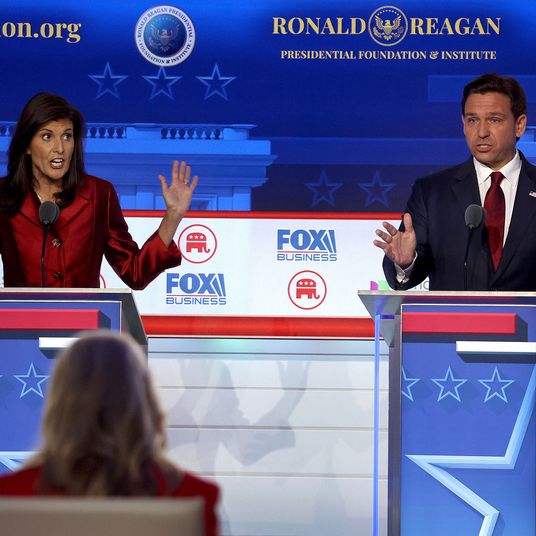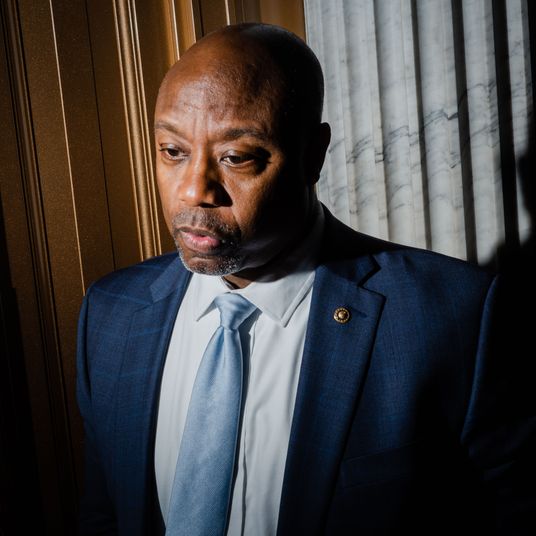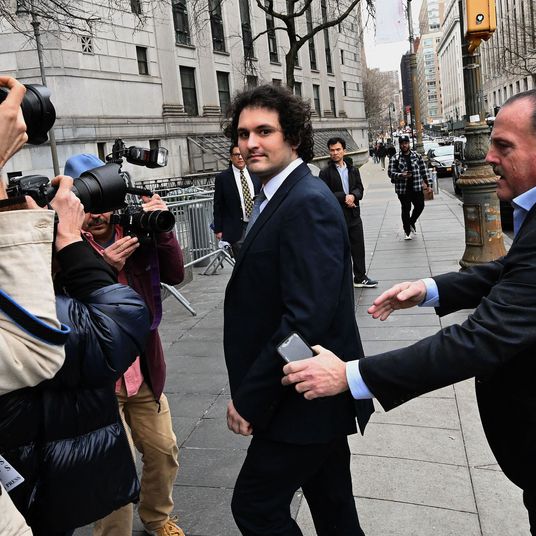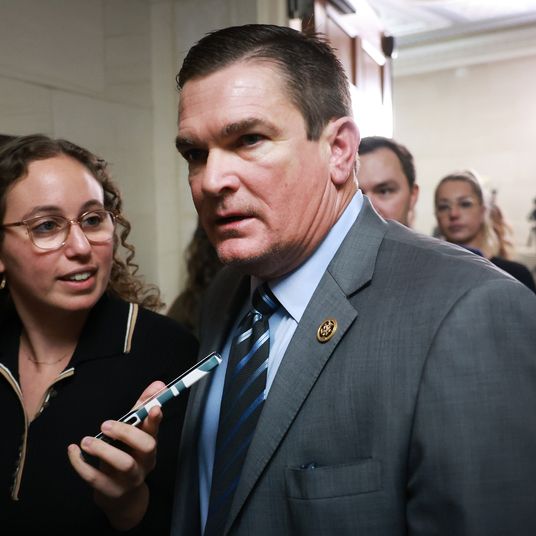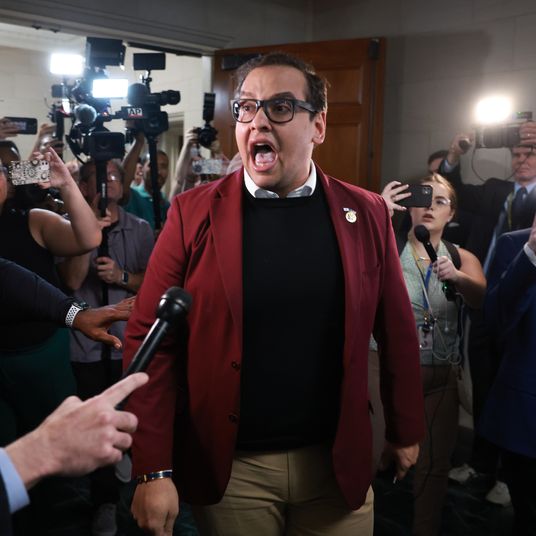
On October 17, the paralyzed and leaderless U.S. House of Representatives is scheduled come to order for the exclusive purpose of electing a Speaker to succeed the recently toppled Kevin McCarthy. The official GOP nominee for the gig, hard-core conservative and close Donald Trump ally Jim Jordan, is making some gains in nailing down votes after 55 House Republicans expressed opposition to his election in a test vote last week:
Even if you assume the concessions Jordan made to House GOP Establishment power broker Rogers will pull other votes in his direction, he can only lose four votes. That sort of unanimity seems exceedingly improbable given the various problems a Speaker Jordan scenario presents, up to and including the boost it would give Trump in his efforts to lock down the 2024 presidential nomination without a real fight. And more generally, as Ben Jacobs explained for this website, the ability of any small group of dissenters to hold the House Republican conference hostage may be an irresistible temptation to all sorts of people:
[B]e it moderates out for revenge, right-wingers out for more concessions, or simply nihilists looking for more cable-television appearances, everyone now has every incentive to use their leverage. The rules had changed and the House was now a tyranny of the minority.
But even if it looks hopeless for Jordan, he’ll probably insist on a public vote by the full House to expose his intraparty opponents to the full wrath of MAGA-land (already aroused into a ham-handed pressure campaign on behalf of the Speaker designate) in hopes of melting them down into a smaller and more malleable group. It’s also possible Jordan is bluffing and will call off the House vote before he shows further weakness, as the Washington Post reports:
Jordan had previously said he wouldn’t hold a vote unless he had the support of 217 Republicans locked down (and remember, there are just 221 House Republicans in total). So some see Jordan’s push for a floor effort as another attempt at bullying members.
If Jordan goes through with it, Republicans who vote against him on the floor could be perceived as voting against Trump because he has endorsed Jordan. It could also draw the ire of right-wing media outlets — and even raise the threat of primary challenges.
Assuming Jordan doesn’t overcome the apparent resistance to his effort to grasp the gavel but is given some more time to fight for it, there will be countless trial balloons raised for alternative prospects. But any would-be Speaker will face the underlying reality that Jacobs explained at New York last week: Now that the seal has been broken by the move against McCarthy, any group of five House Republicans can hold the House hostage for any reason whatsoever:
[B]e it moderates out for revenge, right-wingers out for more concessions, or simply nihilists looking for more cable-television appearances, everyone now has every incentive to use their leverage. The rules had changed and the House was now a tyranny of the minority.
The one thing we know for sure is that while this intraparty gridlock persists, Speaker Pro Tem Patrick McHenry will hold the gavel. The North Carolinian, a close confederate of McCarthy (who chose him for this obscure position in anticipation of precisely this sort of contingency), has so far adopted a very narrow construction of his powers as confined to presiding over the selection of a permanent Speaker. But if that doesn’t happen, he will inevitably be the subject of efforts to find a way to keep the House (and perhaps the federal government) functioning even as Republicans continue their internecine squabbling. Certain Democratic members of the bipartisan Problem Solvers Caucus (itself torn apart by Republican anger at their Democratic colleagues’ refusal to save McCarthy) have publicly floated a proposal to give McHenry expanded powers on a temporary basis, as Axios reports:
Four moderate Democrats led by Rep. Josh Gottheimer (D-N.J.), co-chair of the bipartisan Problem Solvers Caucus, sent a letter to McHenry on Friday proposing a vote to “expand the Speaker Pro Tempore’s authorities.”
In exchange for empowering McHenry for 15-day increments, they wrote, he would guarantee votes on government funding bills and aid packages for Ukraine and Israel.
The Blue Dog Coalition, a group of 10 centrist Democrats, quickly endorsed the measure.
Agreeing to work with Democrats is, of course, precisely what cost McCarthy his job, but it’s possible the same external pressures to get critical work done will at some point push Republicans in the direction of giving McHenry some real power. And perhaps more to the point, if McHenry himself begins cautiously expanding his purview beyond watching his colleagues flounder, what can anyone do about it? Go to court?
Perhaps against all expectations House Republicans can actually unite around a Speaker-designate long enough to reopen the House of Representatives to handle a mounting backlog of business with the clock ticking down to another government shutdown crisis and with wars raging on two continents. But if they wind up casting about for serial Speaker candidates who will then be shaken down for the votes necessary to close the deal, they’d better have a Plan B ready.
More on politics
- Stats Don’t Back Up Republicans’ Crime-Wave Rhetoric
- Jim Jordan Didn’t Just Lose. The Hard Right Did Too.
- DeSantis and Haley See Opening in Trump’s Israel Criticism







